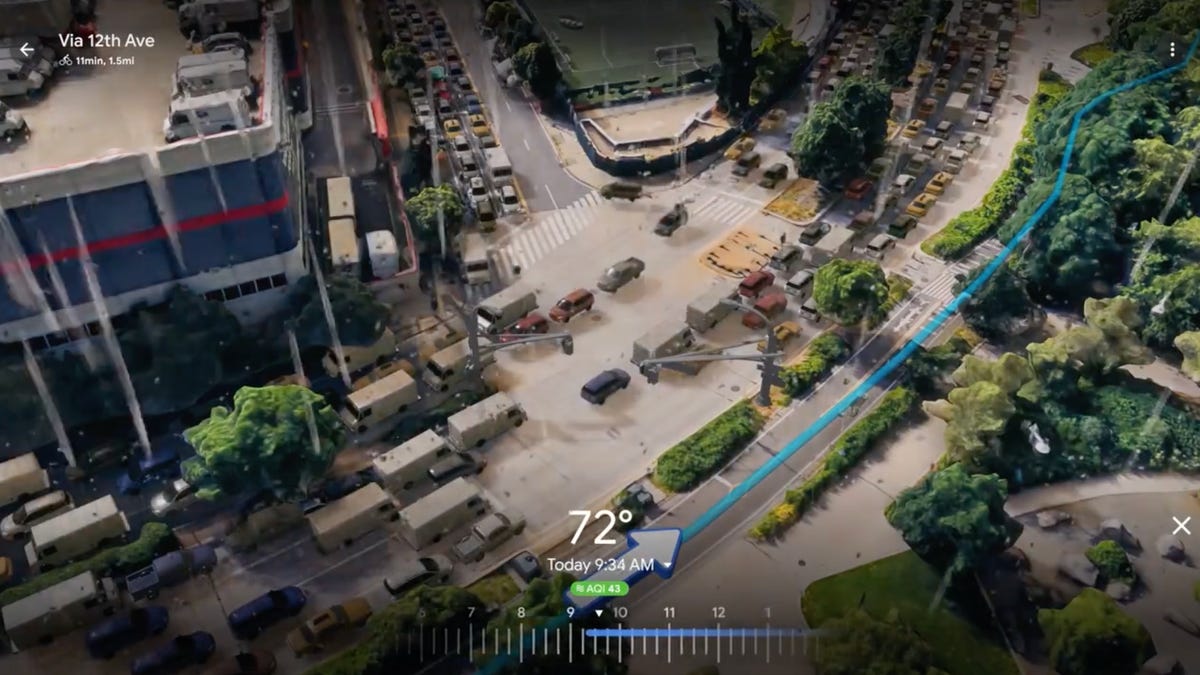Google Maps' AI-Powered Features Rolling Out This Week
Google continues to integrate more AI into its suite of apps.

Google Maps new Immersive View for routes.
Google Maps is getting new immersive features in the coming days and months, fusing assets found via Street View and satellite imagery to make navigation more intuitive, Google said in a blog post Thursday.
Highlighting the blog post is Immersive View for Routes, a feature announced at Google I/O earlier this year. Immersive View gives you a better visual representation of your route, with buildings and foliage to help visualize the world on your phone. Google says it uses AI to "fuse together billions of Street View and aerial images so you can know what a restaurant or landmark is like before you go." Immersive View will start rolling out this week in Amsterdam; Barcelona; Dublin; Florence, Italy; Las Vegas; London; Los Angeles; Miami; New York; Paris; San Francisco; San Jose, California; Seattle; Tokyo and Venice, Italy, on Android and iOS.
Along with Immersive View, Google also pushed Lens in Maps, a feature that helps orient Google Maps by using your phone's camera. Sometimes, Google Maps can get confused on a person's orientation when coming out of the subway, where GPS signal might have been lost. By using your phone's camera in Maps, Google uses AI and augmented reality to help better position itself. Lens will also show information of nearby ATMs, restaurants, cafes and transit points. Lens is coming to 50 additional cities, such as Austin, Texas; Las Vegas; Rome; São Paulo and Taipei, Taiwan.
Google's AI thrust comes as Big Tech is riding an AI revolution. With the release of ChatGPT late last year, the tech industry was caught flat-footed when a relatively new company released a technology that could seemingly answer any question with a novel answer. For a search company like Google, this reportedly set off a code red. Google, which had quietly been working on AI tech for years, started rolling out AI products quickly throughout 2023, focusing much of its I/O developer's conference on AI developments. For a company like Google, which makes the majority of its money from ads sold against search queries, it's now mulling ways to integrate ads into AI-powered search. Considering that generative AI is estimated to add $4.4 trillion to the global economy, according to research firm McKinsey & Co., it makes sense that Google is looking for ways to monetize the tech as quickly as possible.
Other features highlighted by Google include more detailed imagery, with realistic-looking buildings, better highway lane details, especially when tricky exits are coming up, HOV lane information and what Google calls AI-powered speed limit information, which ultimately just displays the speed limit on a given road. Google Maps will soon use AI to suggest thematic lists of things to do by analyzing billions of photos in the coming weeks. For example, when searching for things to do in Tokyo, it'll be able to categorize activities for things like anime or museum exhibitions.
EV drivers aren't left out of the update either. Google Maps will soon add detailed charging station information, such as car compatibility and the last time the charger was actually used, suggesting whether the plug works.
Editors' note: CNET is using an AI engine to help create some stories. For more, see this post.

